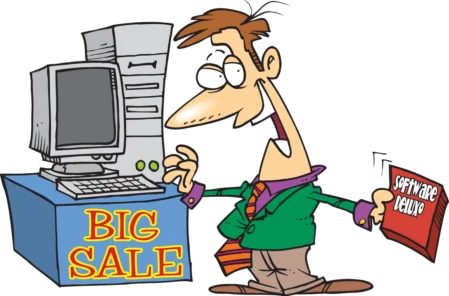Accounting Software
Introduction To Computer Accounting

Accounting software is software that manages and records the day-to-day financial transactions of an organization using revenues, expenses, assets, and liabilities. The accounting software helps you record the flow of your company’s money and examine your financial condition. With it, you can manage customer and vendor contacts, record transactions such as cash receipts and payments, enter purchase invoices, track stock levels, bill customers, and monitor account balances, and generate reports.
Managing your company’s finances can be difficult, which is why you need accounting software to help you track your money as it flows in and out of your accounts. Quality programs have several time-saving options that reduce the time you spend entering data into the system. Depending on the program you have, accounting software can make tasks like invoicing your customers, recording the payments you receive and payments you make, and following up on past-due receivables much easier and faster.
However, the software’s sophistication can vary by vendor. While some systems offer just the basics, allowing you to record what’s coming in and what’s going out, other companies offer more advanced tools, automating tasks you’d otherwise have to perform manually, such as daily data transfers through a bank feed, reconciliation, and recurring invoicing.
Selecting accounting software is a major responsibility that takes a considerable amount of careful planning. After all, if the selected program fails to meet the organization's needs or the accounting staff is not adequately trained to operate it, the business would have wasted much time and money.

Options-Free or Pay For Software
There are no free lunches. Is this true ? For some, free software can meet all their needs. When it comes to more professional use cases, however, you may need paid software. A good rule of thumb is to "use free software until it limits you and you need to upgrade to the paid". So in the end, use what suits you best. If you don't need the advanced features of paid software, use the free app instead. If that changes, you can always buy the professional app.
Desktop, Cloud, or Your Own Server
When selecting accounting software to run their businesses, companies ultimately have two choices: a cloud-based or desktop system. Though desktop software has traditionally been widely used, companies are increasingly switching to the cloud for multiple reasons. Cloud-based software offers inherent benefits, such as enabling finance teams to manage accounting from anywhere, on any device. In addition, leading cloud accounting software vendors often offer more comprehensive and flexible financial management features than desktop accounting software, so companies often start out with desktop software and switch to the cloud as they grow and develop more complex needs.
What is Cloud Accounting ?
Cloud accounting software is hosted by a software vendor, and companies access the software and their financial data over the internet using a browser. They don't need to buy, install and manage software on their own computers. Instead, they pay to use the software on a subscription basis. Key advantages of cloud accounting software include the ability to access financial data from anywhere, using any capable device, as well as automatic data backups. Cloud-based systems typically also integrate more easily with other business applications. This provides a real-time view of information across business operations, including the supply chain, inventory and manufacturing, which facilitates faster, more-informed decision-making.
What Is Desktop Accounting ?
With desktop accounting software, the accounting software and financial data reside on each person's desktop or laptop computer. Companies typically have to buy a software license up front and pay for periodic new releases. They need to manually install the software and back up the company's data. Finance professionals can only access financial data from the computer on which the software is installed, so they need to have that computer with them in order to access the system from home or while traveling. Desktop accounting software handles basic accounting functions but lacks capabilities that many growing companies need. It can be difficult to manage version control among large teams, for example. Limited and inflexible reporting means finance professionals often need to manually export data to spreadsheets for analysis. This is slow and error-prone, and it hinders the company's ability to quickly understand and respond to changes in business conditions.
What Is Your Own Server ?
This option requires some expertise on setting up, maintaining, and running the software. A server is a computer connected to a network of other computers called 'clients'. Client computers request information from the server over the network. Servers tend to have more storage, memory and processing power than a normal computer.
In very simple terms, a server is a type of computer that shares information with other computers. In our case, accounting information is shared and processed using a main computer.
Your First Step in Selecting Accounting Software
- What Are My Needs ?
Before you even start researching different solutions, assess which day-to-day accounting tasks are significant to your business.
The first step in choosing business accounting software is making a checklist of the needs of your business. Then you can short-list the number of options available in accordance with those more closely catering to your needs. Instead of getting lured by the fancy features, give more importance to the ones which specialize in your line of product and business.
- Other Considerations
- Ease Of Use
The more difficult any software is to use, the lower the utilization rates. In the "ole" days, we referred to this as "user friendly".
- Trial Version
- Will It Grow with Me ?
Don’t just think about the features that fit your immediate needs. Consider how the software can support your business as it grows. Is the software constantly improved and newer versions provided at a reasonable price ?
- Reports
Reporting capabilities is crucial for your business as it gives you a complete picture of what's happening to your business. The typical factors to evaluate here are:
- How easy is it to generate reports ? Does it require special training ? Do users require help regularly ?
- Are the reports easy to change with corresponding changes in business operations ?
- Does it have the ability to generate simple as well as complex reports ?
- Modules and functionality
Modules are functional units of the software. Each module performs a specific function. The number of modules available in your software determines the number of tasks it can perform. Further, each module is to be evaluated for the functionality it offers. The key factors regarding module and functionality is does the software provide all the modules your business needs ?
- Import/Export Options
- Training and help
- Is help with doing tasks built into the software ?
- Is a well written instruction manual included ?
- Is online help provided ?
- System Integration
Due to limitations of the software, some data might have to be entered multiple times. This increases the time required to do tasks involving different software. When all software can talk to all other software, the system is said to be fully integrated. In other words, once you enter information, the sotware automatically processes the information and updates all the related files.
- Total cost of ownership
- What are the costs of the implementation of the software? This includes costs of installation, configuration, training, data conversion, and documentation.
- Is the hardware (computer) supported by the new software? Is your hardware outdated and needing to be replaced ?
- What are the fees for software support ?
- What are the costs of operation ? These include costs of supplies, maintenance, backup, and upgrades.

To Sum It All Up, is the software easy to use and does it provide the information needed by your business in a timely and cost effective manner.
Lesson Review
